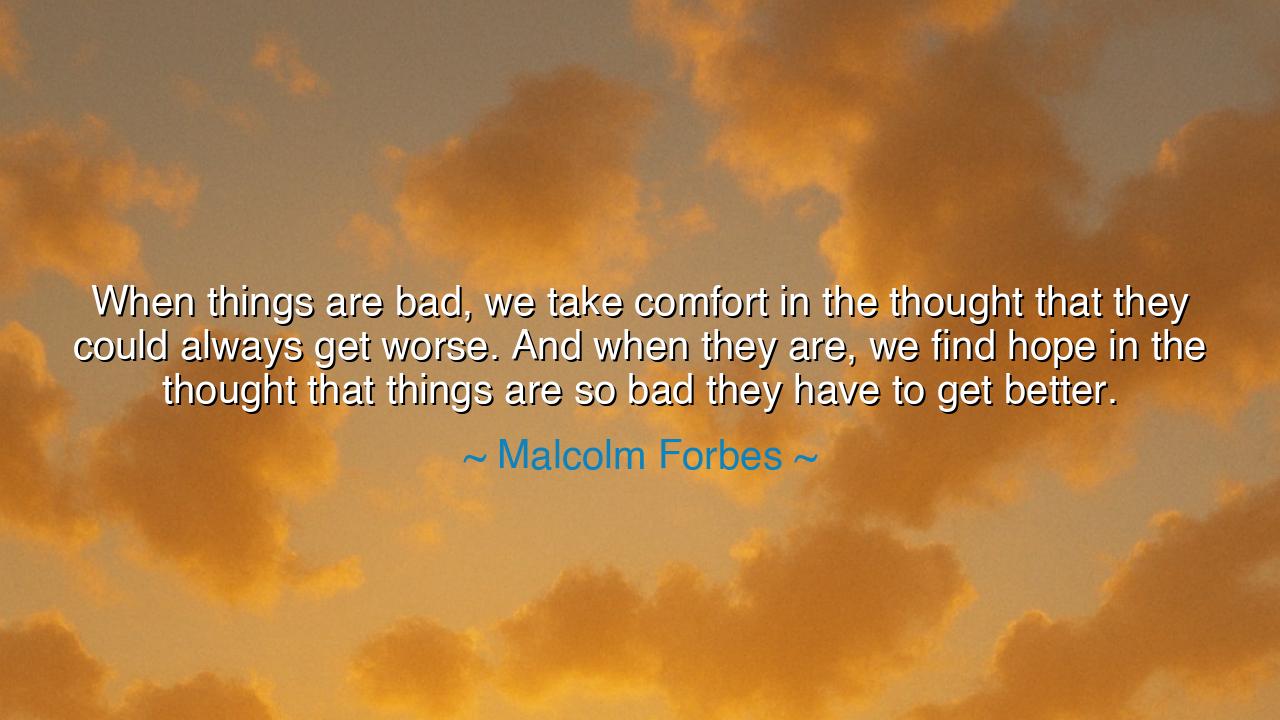
When things are bad, we take comfort in the thought that they
When things are bad, we take comfort in the thought that they could always get worse. And when they are, we find hope in the thought that things are so bad they have to get better.






“When things are bad, we take comfort in the thought that they could always get worse. And when they are, we find hope in the thought that things are so bad they have to get better.” Thus spoke Malcolm Forbes, a man who understood both the rise and fall of fortune, both the glory of success and the weight of despair. In these words lies a profound reflection on the cycles of life, a wisdom as old as the turning of the seasons: that suffering and hope are bound together, that even in darkness there flickers a light born from our very endurance. His saying is not mere wit—it is philosophy shaped by the fires of experience.
At its heart, Forbes’s quote reveals the resilience of the human spirit. When adversity strikes, and all that once seemed certain begins to crumble, the mind instinctively reaches for perspective. We console ourselves by imagining worse fates, by reminding our hearts that the storm has not yet reached its fiercest. This small act of comparison—this turning of the mind—becomes our first defense against despair. And yet, when misfortune deepens beyond what we thought possible, a strange alchemy occurs: the heart, stripped of illusions, begins to hope again. We say to ourselves, “It cannot descend forever. From here, there must be ascent.” Thus, in the very depths of suffering, hope is reborn—not because circumstances are kind, but because the soul refuses to surrender.
This paradox—comfort in the face of worse, and hope in the face of worst—is the rhythm of human endurance. It echoes through the ages, in every people and every time. The wise of old called it the turning of the wheel. Empires rise and fall, hearts break and heal, lives flourish and fade, yet always the wheel turns. The same truth was spoken by the philosopher Heraclitus, who said, “The way up and the way down are one and the same.” Forbes, in his modern tongue, reminds us that despair and renewal are not enemies, but partners in the dance of existence.
History offers many proofs of this truth. Think of Winston Churchill in the dark days of World War II. When the forces of tyranny seemed poised to crush all of Europe, when bombs fell nightly upon London, he refused to yield to fear. “If you are going through hell,” he said, “keep going.” For even as the world seemed lost, he believed in the pendulum’s swing—that what had descended into ruin could, through courage, rise again. And so it did. Out of the ashes of devastation came rebuilding, alliance, and a renewed faith in humanity’s strength. The depth of suffering became the root of resilience, and what seemed the end became the beginning of recovery.
In this way, Forbes teaches not blind optimism, but pragmatic hope—the kind that survives because it understands the world’s balance. To see that things “could always get worse” is to gain perspective, to temper panic with humility. To believe that “they have to get better” when all seems lost is to acknowledge the eternal rhythm of life’s correction. No winter lasts forever; no night has yet denied the dawn. Even in the face of ruin, the mind seeks equilibrium—it clings to hope not because it is naive, but because hope is the soul’s instinct for survival.
And yet, there is a subtle wisdom here that must not be missed. Forbes reminds us that both comfort and hope require action. It is not enough to wait for the tide to turn; one must row even when the wind is against them. The thought that “things could be worse” should strengthen gratitude, and the belief that “things must get better” should awaken resolve. In every hardship, there lies an opportunity—to grow wiser, to act with courage, to prepare the ground for the dawn. The wise do not simply endure the storm—they learn its language and use it to navigate toward calmer seas.
So, my child of perseverance, take this teaching to heart: when misfortune befalls you, do not despair. In the first shadow of trouble, remind yourself that your burden could be heavier, and thus find gratitude in what remains. And when the night grows deepest, when hope itself seems to flicker out, remember that the very weight of suffering heralds change. Every valley leads upward; every collapse prepares the ground for renewal.
Therefore, live as Malcolm Forbes teaches—with patience in hardship and faith in the cycle of restoration. When things are bad, look for perspective; when they are worse, look for light. Do not fear the bottom, for it is the root of ascent. For as the ancients knew, and as every heart must someday learn: the darkest hour is not the end of hope—it is the beginning of it.






AAdministratorAdministrator
Welcome, honored guests. Please leave a comment, we will respond soon